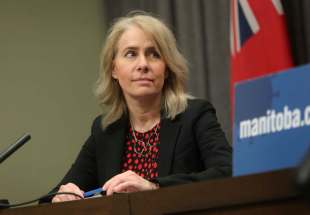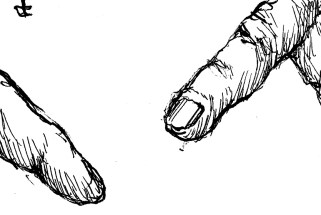Manitoba’s COVID crisis escalates More ICU patients transferred to Ontario as province asks for help from Ottawa
Read this article for free:
or
Already have an account? Log in here »
To continue reading, please subscribe:
Monthly Digital Subscription
$1 per week for 24 weeks*
- Enjoy unlimited reading on winnipegfreepress.com
- Read the E-Edition, our digital replica newspaper
- Access News Break, our award-winning app
- Play interactive puzzles
*Billed as $4 plus GST every four weeks. Offer only available to new and qualified returning subscribers. Cancel any time.
Read unlimited articles for free today:
or
Already have an account? Log in here »
Hey there, time traveller!
This article was published 21/05/2021 (1383 days ago), so information in it may no longer be current.
Manitoba’s COVID-19 crisis deepened Friday as more critically ill patients were transferred to Ontario, Winnipeg’s test positivity rate hit a new high and the province sought help from Ottawa for a health-care system pushed to the brink.
Manitoba announced 594 new cases, nearly matching Thursday’s single-day record of 603. The test positivity rate provincially climbed to 14.1 per cent, while Winnipeg’s rate swelled to a record 16.1 per cent.
The number of critically ill patients transferred to Ontario hospitals rose to five earlier in the day, with two more scheduled to be flown out in the evening, bringing the total number to seven.
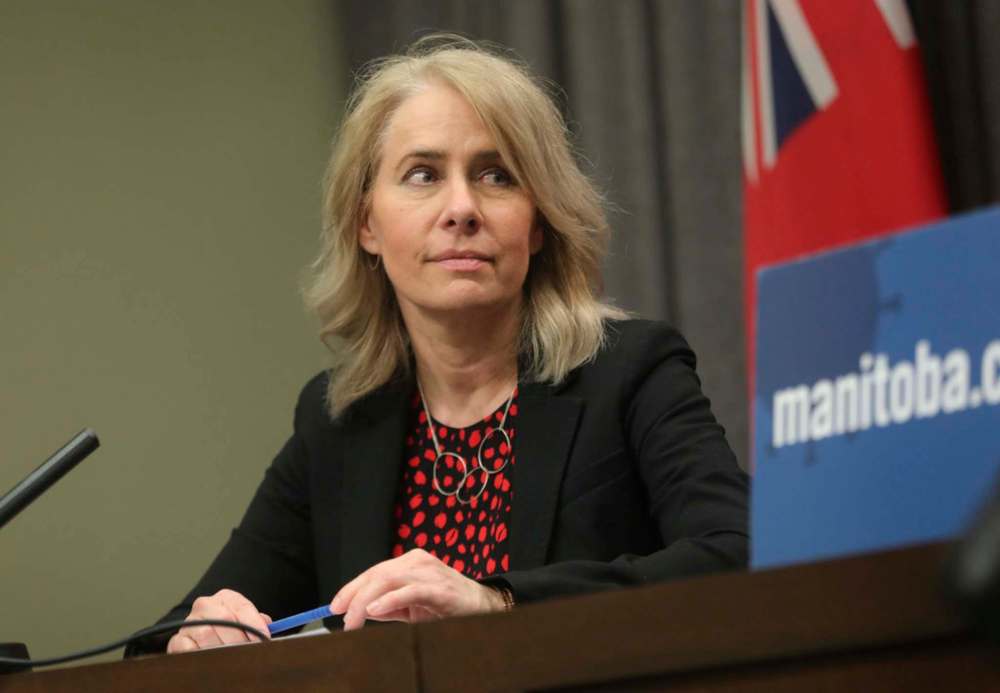
Officials have said as many as 20 ICU patients, in total, may be transported to five northwestern Ontario hospitals in the coming days, but there are already indications the demand for transfers may be significantly greater.
Manitoba’s COVID-19 infection rate over the past two weeks has soared to 470 per 100,000 in population — the highest in the country and more than twice the national average.
With case numbers skyrocketing and hospital staff already stretched thin, Premier Brian Pallister spoke with Prime Minister Justin Trudeau Friday morning to request 50 critical care nurses and 20 respiratory therapists.
“Our health system is on the brink of being overwhelmed. Contingency plans are being triggered and people are tired,” Shared Health chief nursing officer Lanette Siragusa told a media briefing Friday.
On Wednesday, Manitoba transferred three ICU patients to Ontario hospitals. On Friday, the government announced that two more critically ill patients had been sent out of province, and late in the day it said that another two would be flown out.
Of the latter two patients to be transported, one was expected to be transferred to Ottawa, a spokesperson said in a statement, while the other was headed to North Bay.
“This additional option (moving patients beyond northwestern Ontario to the nation’s capital) provides critical care teams in Manitoba the opportunity to move patients identified as appropriate for transfer in a timely manner, which will help with patient flow,” the spokesperson said.
In addition to transferring patients to Ontario, contingency plans involve more cuts to non-urgent surgeries to free up nurses and the addition of more ICU beds.
Asked about the possibility of sending critically ill patients to Saskatchewan, Siragusa said “nothing is off the table.” Pressed further, she said “conversations are just now beginning to happen” with Saskatchewan, but “nothing is firm (and) no contracts are in place at this time.”
Hospitals are working to identify more ICU patients stable enough to be transferred to Ontario as the demand for critical care beds rises sharply — and with no let-up on the immediate horizon.
On Thursday alone, 10 new patients were admitted to Manitoba ICUs. As of early Friday, 129 patients were in ICUs, including 79 with COVID-19 or who were recovering from the virus. That equalled the high during the second wave.
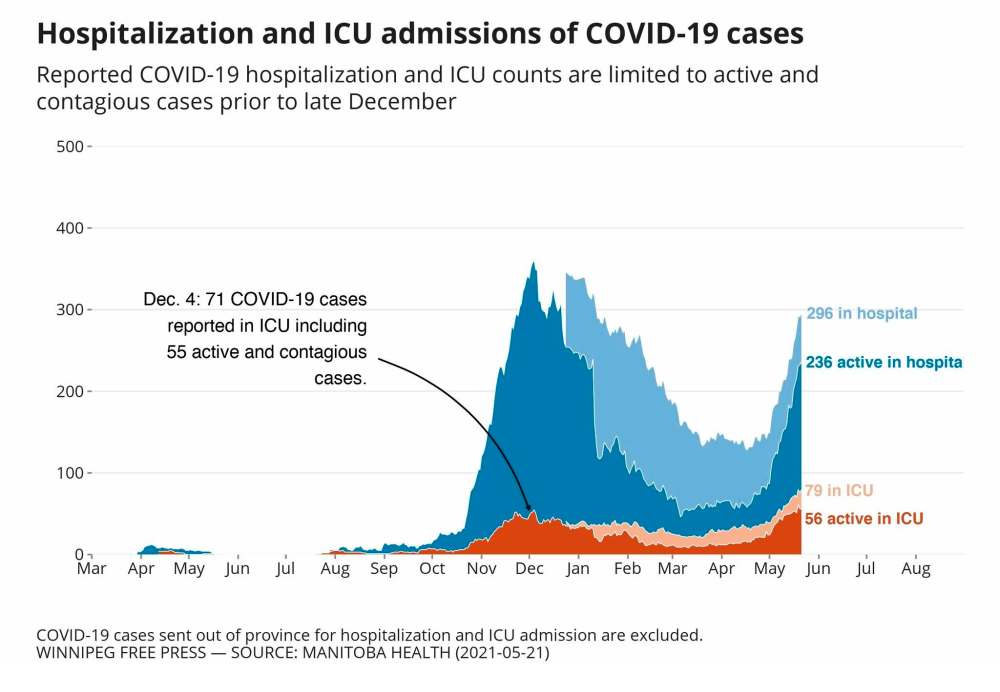
As of Friday, the number of critical care beds was increased to 140, nearly double the province’s pre-COVID baseline capacity. Health officials have said as many as 170 could be activated, although staffing remains a limiting factor.
Most COVID-19 patients not vaccinated
An analysis of COVID-19 hospital admissions during the first half of May shows how important it is to get vaccinated, says Dr. Jazz Atwal, the province’s deputy chief public health officer.
At a briefing Friday, Atwal said 82 per cent of the 331 virus-related hospital admissions from May 1 to 16 involved people who had yet to be vaccinated.
An analysis of COVID-19 hospital admissions during the first half of May shows how important it is to get vaccinated, says Dr. Jazz Atwal, the province’s deputy chief public health officer.
At a briefing Friday, Atwal said 82 per cent of the 331 virus-related hospital admissions from May 1 to 16 involved people who had yet to be vaccinated.
Another eight per cent had received one dose of vaccine, but not before two weeks had elapsed — the time it takes for the vaccine to become effective.
Of those admitted to hospital, nearly 50 per cent were under the age of 50.
Meanwhile, 85 of the 331 COVID patients hospitalized required critical care. Of the 85, 78 per cent had not been vaccinated at all, and another 16 per cent had got their first shot fewer than 14 days before entering hospital.
“There was no one admitted to the ICU during that time who had two doses of vaccine,” Atwal said as he encouraged all Manitobans to get their shot as soon as they’re able.
“The vaccine protects people from getting sick and seriously ill,” he said.
NDP Leader Wab Kinew said he wanted to “push back” against the Pallister government for “seeming to want to blame people who are in ICUs for their current health status by sharing numbers around the vaccination status of these folks.”
Many of the people in the ICU now likely weren’t eligible to have been vaccinated soon enough prior to being exposed to the virus, he said Friday.
“We need a government taking action but not one that is blaming people in ICUs,” Kinew said. “Many people were saying ‘let’s accelerate the vaccine rollout’, many were saying ‘let’s staff up the ICUs’. I can’t help but feel this is another tactic to shift blame away from the government’s responsibility to fight the pandemic.”
— Larry Kusch and Carol Sanders
Reducing the number of scheduled surgeries is expected to free up 50 nurses to care for COVID-19 and other critically ill patients. Another 37 nurses have completed a two-week orientation program in critical care and will join hospital ICU teams, Siragusa said.
Under questioning from journalists, Dr. Jazz Atwal, the province’s deputy chief public health officer, defended Manitoba’s public health orders.
The crisis now facing the province could have been avoided if more Manitobans had followed the rules, he said.
“I don’t think this is a failure of any one particular entity,” Atwal said. “Every Manitoban needs to look in the mirror.”
Manitobans have gathered in defiance of public health orders and failed to stay home or get tested when they got sick.
“They’re having a tube put down their throat (in hospital) and that’s when their first COVID test is. That’s not adhering to (health officials’) messaging,” Atwal said.
The government also announced Friday that Health Minister Heather Stefanson was undergoing a necessary medical procedure and would be absent from the legislature for the remainder of the spring sitting, which ends June 1. The announcement came a day after Stefanson held a news conference to announce long weekend restrictions and urge Manitobans to stay at home.
The province did not say when Stefanson will return.
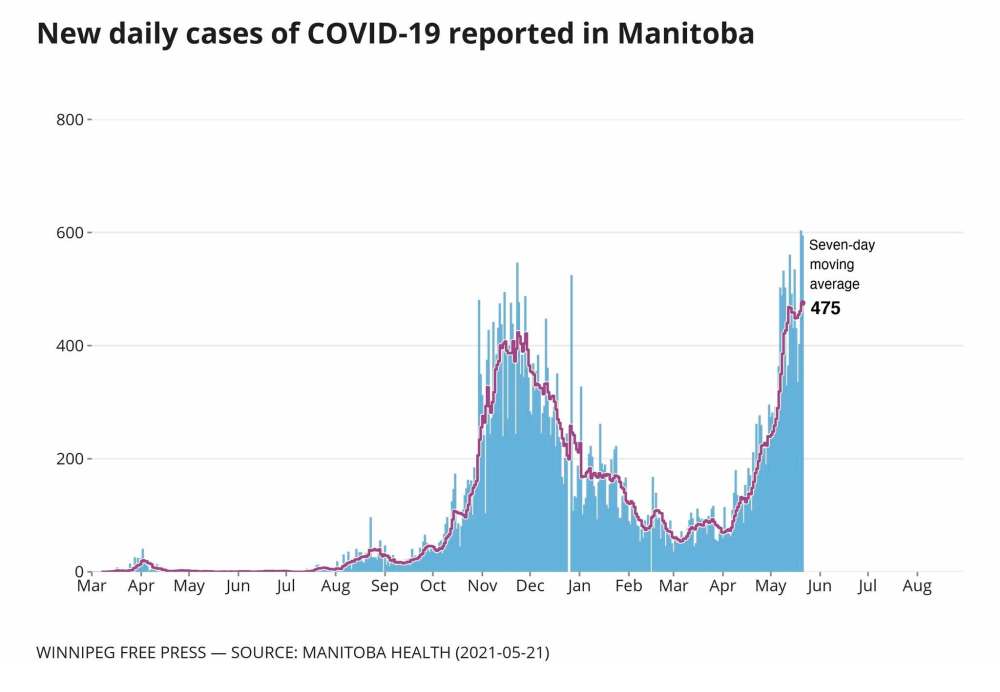
Recipe for disaster
The Manitoba Association of Health Care Professionals says the growing number of critical patient transports and the acute shortage of specialized respiratory therapists needed to perform them “are a recipe for disaster.”
The Manitoba Association of Health Care Professionals says the growing number of critical patient transports and the acute shortage of specialized respiratory therapists needed to perform them “are a recipe for disaster.”
The transports to Ontario this week have highlighted a longstanding and increasingly precarious issue, president Bob Moroz said Friday.
The inter-facility transport team consists of respiratory therapists and paramedics based at HSC in Winnipeg.
It is responsible for a variety of patient transports within Manitoba and out of province, including ground transportation and flights, and non-emergent transports of critical COVID patients bound for the ICU.
The team has seen a marked increase in transports due to the pandemic and a surge in recent days due to the third wave, putting the therapists in an “impossible situation” where they’re being pulled in too many directions, Moroz said in a statement.
— Carol Sanders
“The timing of her return will be based on the advice of her physician,” a statement said.
The medical procedure is being done in Manitoba, Blake Robert, director of media relations, later confirmed. He said it is “medically necessary and is taking place on the recommendation of her physician.”
Deputy Premier Kelvin Goertzen, a former health minister, will serve as acting health minister.
— with files from The Canadian Press
larry.kusch@freepress.mb.ca
carol.sanders@freepress.mb.ca

Larry Kusch
Legislature reporter
Larry Kusch didn’t know what he wanted to do with his life until he attended a high school newspaper editor’s workshop in Regina in the summer of 1969 and listened to a university student speak glowingly about the journalism program at Carleton University in Ottawa.

Carol Sanders
Legislature reporter
After 20 years of reporting on the growing diversity of people calling Manitoba home, Carol moved to the legislature bureau in early 2020.
Our newsroom depends on a growing audience of readers to power our journalism. If you are not a paid reader, please consider becoming a subscriber.
Our newsroom depends on its audience of readers to power our journalism. Thank you for your support.
History
Updated on Friday, May 21, 2021 6:31 PM CDT: Full write-thru with extra info, quotes, fact boxes, formatting

